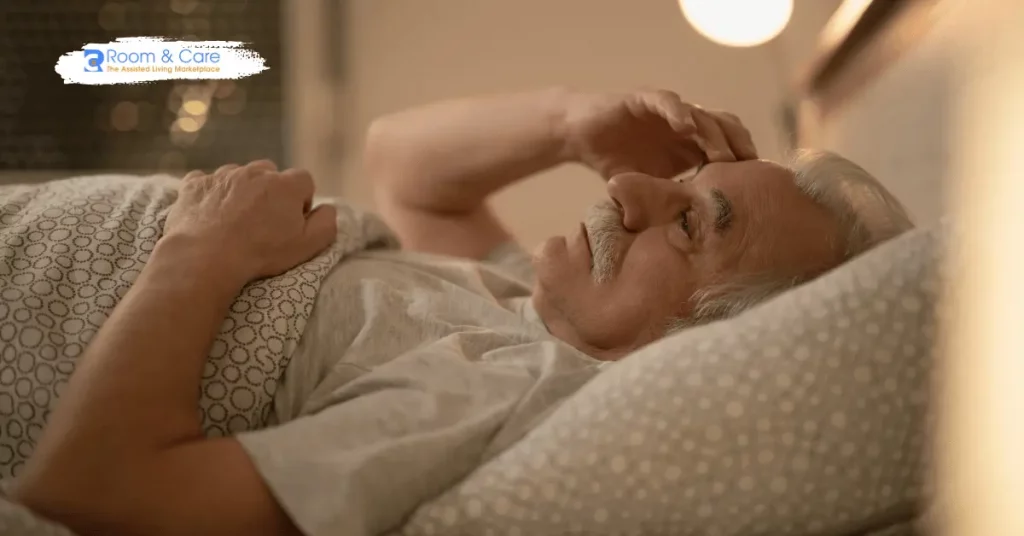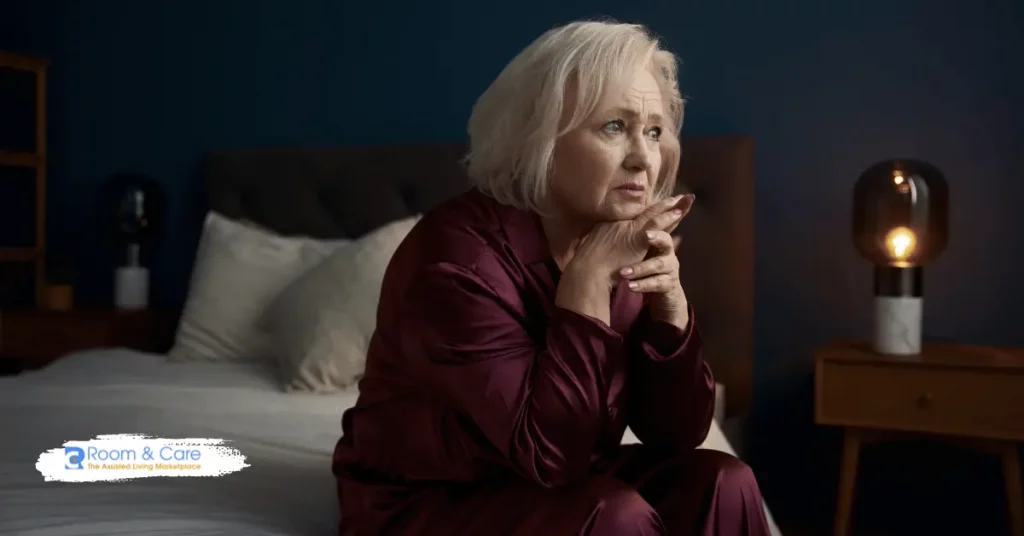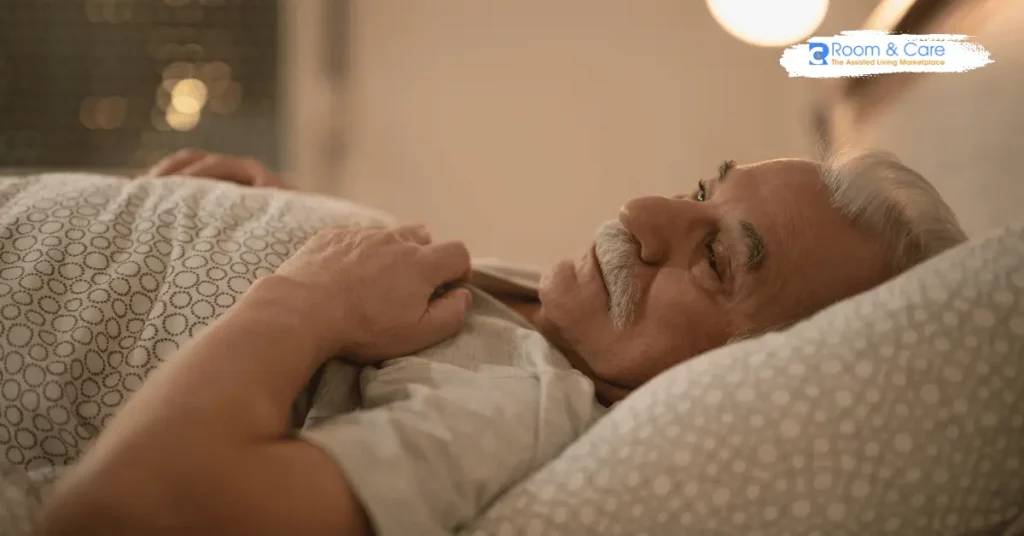

Anxiety in elderly at night is a pressing concern that affects many older adults, impacting their overall well-being, sleep quality, and daily functioning. As night falls, many seniors experience heightened feelings of anxiety, restlessness, and even panic, making it difficult to achieve restful sleep. This issue is especially relevant in senior living settings such as adult family homes, assisted living facilities, and nursing homes, where anxiety at night can disrupt both the affected individuals and those around them. Understanding the causes, symptoms, and effective management strategies is crucial for anyone caring for an elderly loved one or working in a senior care environment.
In this comprehensive guide, we will delve into why anxiety at night is so prevalent among the elderly, explore practical solutions to manage it, and discuss how choosing the right senior living community can make a significant difference.
Anxiety in elderly individuals at night can stem from various factors that combine to create a sense of unease or fear as darkness sets in. It is essential to understand these triggers to address the root cause effectively.
As people age, their bodies undergo numerous changes that can contribute to nighttime anxiety. Chronic pain from arthritis, heart conditions, respiratory problems, and other age-related health issues can make it hard for seniors to find comfort at night. Sleep disorders, such as insomnia or restless leg syndrome, are also more prevalent in older adults, disrupting sleep and increasing anxiety levels.
Medications commonly prescribed for these conditions can have side effects that exacerbate anxiety or interfere with sleep. For instance, certain heart medications, antidepressants, or corticosteroids may cause jitteriness, restlessness, or insomnia, making it difficult to relax and sleep soundly.
Psychological aspects, such as fear of falling, worrying about health, loneliness, or even the fear of death, can weigh heavily on the minds of elderly individuals, especially at night when distractions are minimal. Cognitive decline, such as that associated with dementia or Alzheimer’s disease, can also contribute to nighttime anxiety. Individuals with dementia may experience “sundowning,” a condition characterized by increased confusion, agitation, and anxiety as the day turns into night.
The living environment plays a crucial role in how anxiety manifests at night. For seniors in assisted living facilities or nursing homes, adjusting to a new environment, unfamiliar sounds, or different routines can heighten anxiety. Additionally, changes in routine, such as a new caregiver or modifications in the daily schedule, can create a sense of insecurity and fear. Poor lighting, lack of a familiar environment, or even too much quiet can also be unsettling for seniors accustomed to different conditions.
Sleep patterns change with age, often leading to lighter, shorter, or more fragmented sleep. Seniors may wake up more frequently during the night, find it hard to fall back asleep, or experience vivid dreams or nightmares. Poor sleep hygiene, such as irregular sleep schedules, late-night eating, or consuming caffeine or alcohol before bed, can also aggravate anxiety at night.
Recognizing anxiety symptoms is the first step in managing the condition effectively. Symptoms may vary from person to person, but common signs of anxiety in elderly individuals at night include:
Caregivers, family members, and staff in senior living communities must be observant of these signs and respond promptly to provide reassurance and support.
Senior living communities, including adult family homes, assisted living facilities, and nursing homes, are uniquely positioned to support seniors experiencing anxiety at night. Here are several ways these communities can make a difference:
A safe and secure environment is fundamental to reducing anxiety in elderly residents. Assisted living facilities can provide a structured routine that helps seniors know what to expect throughout the day, reducing feelings of uncertainty that may contribute to anxiety. Additionally, personalizing living spaces with familiar objects, such as family photos, favorite blankets, or cherished items, can help seniors feel more comfortable and less anxious.
Establishing a consistent sleep routine is essential for promoting better sleep hygiene among elderly residents. Regular wake-up and bedtimes, along with structured daily activities, can help regulate the body’s internal clock, reducing nighttime wakefulness and anxiety. Activities that promote relaxation, such as listening to calming music, reading, or gentle stretching exercises, should be encouraged in the evening.
Proper training for caregivers and staff is crucial in managing nighttime anxiety in elderly residents. Staff should be trained to recognize early signs of anxiety and know how to respond with empathy and effective interventions. This might include offering reassurance, guiding residents through breathing exercises, or providing distractions to help calm their anxiety.
Many seniors experience anxiety due to feelings of isolation or loneliness, especially at night. Senior living communities can offer various social activities and opportunities for interaction with caregivers and other residents. Group activities, community meals, and social events can help build connections and a sense of belonging, reducing the likelihood of anxiety at night.
Access to mental health resources is vital in managing anxiety in elderly individuals. Communities should have mental health professionals available to provide counseling or therapy, such as cognitive behavioral therapy (CBT), which is effective in treating anxiety. Encouraging open communication about mental health and reducing stigma around seeking help is also important.

While senior living communities play a crucial role, there are several practical steps that caregivers and family members can take to help manage anxiety in elderly loved ones at night.
Developing a calming bedtime routine is key to reducing anxiety. Encourage activities that promote relaxation, such as taking a warm bath, engaging in light stretching, or practicing deep breathing exercises. Avoid stimulating activities, like watching TV or using electronic devices, which can interfere with the body’s natural sleep-wake cycle.
Make the bedroom a tranquil space that promotes sleep. Use blackout curtains to block out light, keep the room at a comfortable temperature, and minimize noise with a white noise machine or fan. Ensure the bed is comfortable with supportive pillows and a cozy mattress. In senior living settings, make sure the room is personalized with familiar objects to create a sense of safety and comfort.
A balanced diet and proper hydration are essential for managing anxiety. Limit caffeine and alcohol intake, particularly in the afternoon and evening. Encourage light snacks like fruits or crackers that promote relaxation before bed. However, avoid heavy meals close to bedtime, which can cause discomfort and disrupt sleep.
Regular physical activity is beneficial for both physical and mental health. Activities like walking, chair yoga, or light aerobic exercises during the day can help reduce anxiety and improve sleep quality. Many assisted living facilities offer group exercise classes that not only keep residents active but also provide opportunities for social interaction.
Medication side effects can significantly impact anxiety levels and sleep quality. Regularly review medications with healthcare providers to ensure that any drugs that might cause anxiety or insomnia are identified and managed appropriately. Adjusting the timing of medication administration or switching to alternative medications may help alleviate anxiety symptoms.
If anxiety persists or becomes overwhelming, consider seeking professional counseling or therapy. Mental health professionals can provide strategies and tools, such as cognitive-behavioral therapy (CBT), to help manage anxiety. In some cases, medications may be prescribed to help alleviate severe anxiety symptoms.

Q: Is anxiety in elderly at night common, and why does it occur?
Yes, anxiety in elderly individuals at night is common. It occurs due to a combination of physical changes, psychological factors, environmental triggers, and medication side effects. Proper management and support can help alleviate symptoms and improve quality of life.
Q: How can senior living communities help manage nighttime anxiety?
Senior living communities can provide a safe, structured environment, offer social and emotional support, train staff to recognize and respond to anxiety symptoms, and ensure access to mental health resources. These measures help create a sense of security and comfort for residents.
Q: What should I do if my elderly loved one experiences anxiety at night?
Encourage a calming bedtime routine, optimize the sleep environment, monitor diet and hydration, promote physical activity, review medications with healthcare providers, and consider professional counseling. These strategies can help reduce anxiety and improve sleep quality.
Q: Can anxiety at night lead to other health issues in seniors?
Yes, chronic anxiety can lead to sleep deprivation, which increases the risk of falls, cognitive decline, weakened immunity, and other health problems. Effectively managing anxiety is crucial for maintaining overall health and well-being.
When anxiety becomes a persistent issue, finding the right senior living community can provide the support and care necessary to manage it effectively. Look for communities that offer:
At Room and Care, we help families find the best assisted living facilities, adult family homes, memory care facilities, nursing homes, and independent living communities tailored to their loved one’s needs. With our easy-to-use platform, you can filter options based on specific requirements, such as facilities that allow pets or provide specialized care. Unlike other services, Room and Care connects you directly with these communities without referral fees or middlemen, ensuring you find the right care at the best price.
Anxiety in elderly at night is a complex and multifaceted issue that requires a compassionate and comprehensive approach. Understanding the causes, recognizing the symptoms, and implementing effective management strategies can significantly improve the quality of life for seniors. Whether caring for a loved one at home or considering a move to a senior living community, knowing the right steps to take can make all the difference.